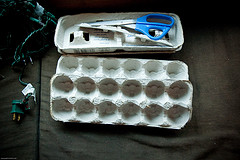The Risks of Repurposing Egg Cartons
 Repurposing is a way of life these days, reducing the amount of usable items that end up in landfills, as well as saving money and stimulating creativity. One common item, the humble egg carton, offers possibilities for reuse that range from children’s crafts to sprouting seeds to organizing drawers and much more. But chickens – and their eggs – may carry salmonella bacteria. Might there be some risk of infection via egg cartons? With memories of the 2010 contaminated egg scandal still fresh in the minds of American consumers, it’s time to look at just how safe reusing these cartons really is.
Repurposing is a way of life these days, reducing the amount of usable items that end up in landfills, as well as saving money and stimulating creativity. One common item, the humble egg carton, offers possibilities for reuse that range from children’s crafts to sprouting seeds to organizing drawers and much more. But chickens – and their eggs – may carry salmonella bacteria. Might there be some risk of infection via egg cartons? With memories of the 2010 contaminated egg scandal still fresh in the minds of American consumers, it’s time to look at just how safe reusing these cartons really is.
Salmonella and Salmonellosis
First of all, the danger needs to be defined. Salmonella is not itself a disease but a type of bacterium, salmonella enterica. This bacterium causes food poisoning, known as salmonellosis. The symptoms of salmonellosis are not pretty, consisting of fever or chills, abdominal cramping and severe vomiting and/or diarrhea. Although these generally subside after four to seven days, the bowel may continue to be mildly affected for several months. Even more serious results of salmonella infection are typhoid fever and Reiter’s Syndrome (reactive arthritis). Population groups at highest risk for salmonellosis are infants and young children, senior citizens and those with weak immune systems, for whom the illness might be fatal.
Salmonella is spread via contaminated foods, including poultry and poultry products. Dirty or cracked eggs may transfer salmonella to their carton, where it can survive for weeks.
Salmonella in the News
Salmonella is, unfortunately, a serious issue today. On June 3, 2014, the top executives of Quality Egg LLC pleaded guilty in federal court to distributing contaminated eggs in interstate commerce. The charges stemmed from the major outbreak of salmonellosis in 2010, which affected 2000 people and caused some 500 million eggs to be recalled. That same month, the Israel Health Ministry issued a ban on utilizing used cardboard egg cartons for arts and crafts in the country’s schools and day care centers, due to the danger of salmonella. The Department of Health and Human Services in Australia has also advised against reusing egg cartons to avoid cross-contamination, as does a joint publication of Cornell University and the Farmer’s Market Federation of New York.
Shop and Handle Wisely
Use common sense when you go grocery shopping. Look for eggs and cartons that are relatively clean, without blood, droppings or cracks. (If you do buy soiled eggs, avoid washing until just before use. Washing eggs removes their natural protective coating and exposes them to contamination.) Never replace eggshells in the carton after using their contents; I had a roommate who used to do this – not healthy!
Eggs that have been treated to safeguard against salmonella contamination are available. Pasteurized eggs are naturally processed in a water bath and do not seem to offer any major disadvantages other than a slight loss of flavor. However, irradiated eggs are a different story. Repurpose of cartons from these types of eggs does not pose any risk of salmonellosis.
What You Can Do with Old Egg Cartons
Styrofoam cartons, while not the most environmentally friendly choice, may be reused after washing with soap and hot water. Cardboard cartons from untreated eggs are not recommended for crafts projects (especially for kids), storage, packing material or other household uses where they will be handled regularly or come into contact with food. However, gardeners can use them to start seedlings indoors in Minnesota’s chilly early spring, for transfer directly to their Minneapolis landscape when the weather warms up. Paperboard cartons may be torn into pieces and add to your compost pile, or taken to the recycling bin. After any of these repurposes, wash your hands well with hot soapy water.
Laura Firszt writes for networx.com.
Updated April 23, 2018.
Looking for a Pro? Call us (866) 441-6648

Landscaping Average Costs
Landscapers Experiences

Bathroom Ceiling Painting And Repair Required By Mortgage Lender

Time Was Of The Essence When My Tenants’ Roof Blew Off



